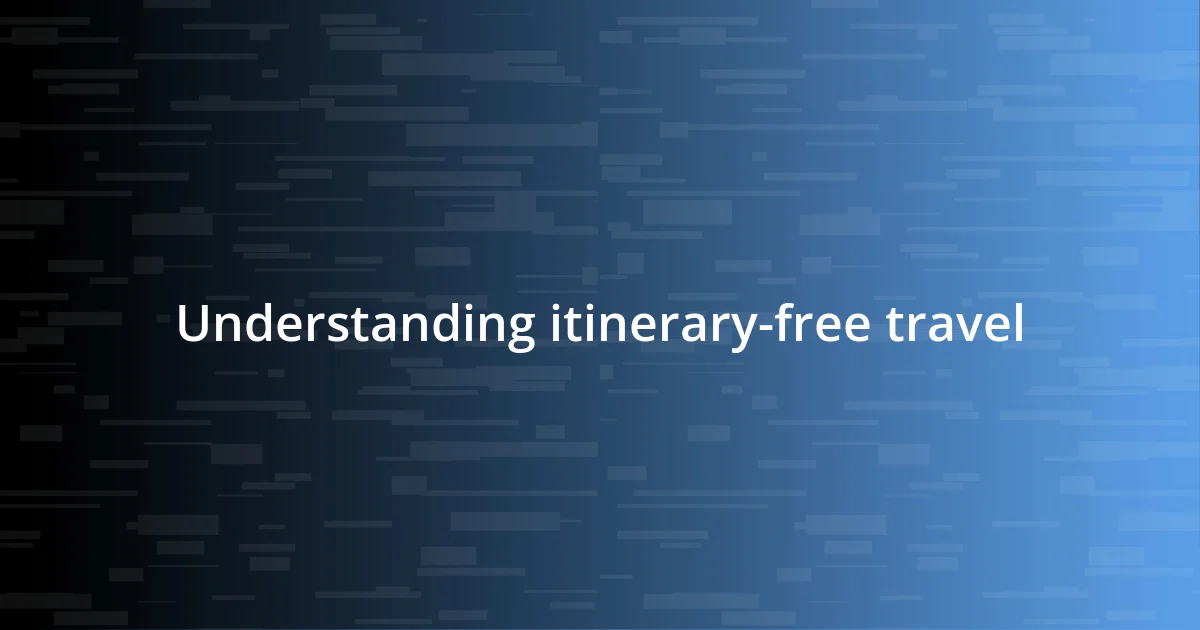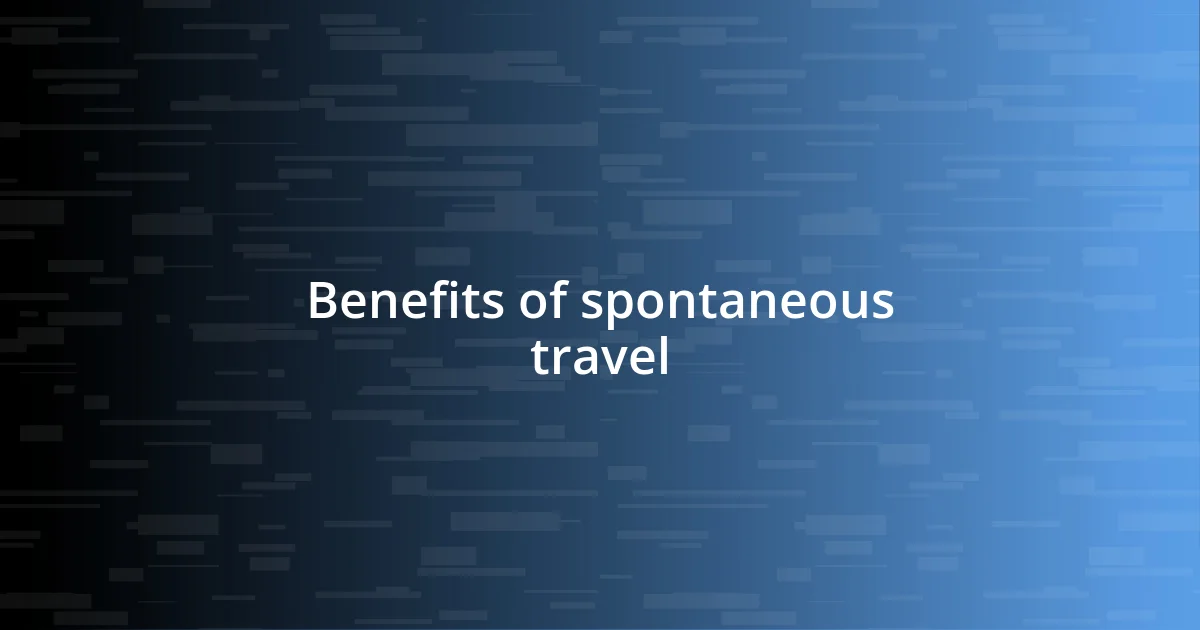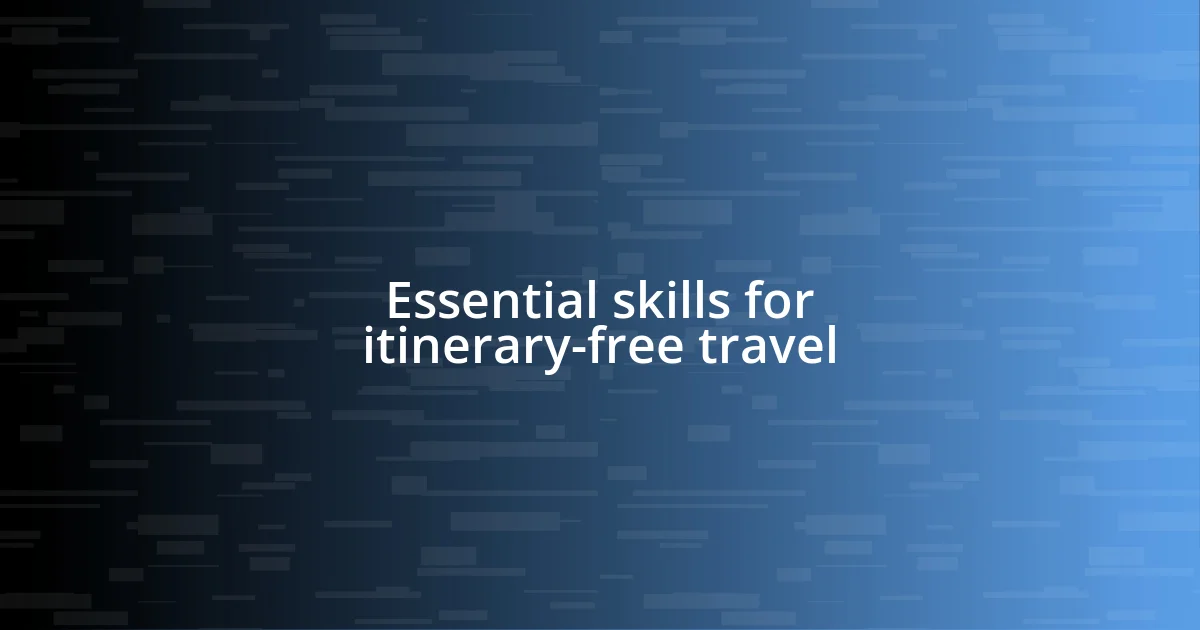Key takeaways:
- Itinerary-free travel encourages spontaneity, leading to unique experiences and personal growth through unexpected encounters.
- Key skills for this style of travel include adaptability, map reading, and curiosity to navigate and engage with new environments.
- Reflecting on travel experiences deepens understanding of both the destinations and oneself, enhancing the overall journey.

Understanding itinerary-free travel
Itinerary-free travel opens a world where spontaneity reigns supreme. I remember wandering through the vibrant streets of Florence, allowing my curiosity to guide me instead of a strict schedule. With no reservations, I stumbled upon a quaint café with the best gelato I’d ever tasted, something I’d have missed had I rigidly followed an agenda.
Imagine waking up each day not knowing exactly how it will unfold. This freedom can be exhilarating, yet it also invites uncertainty. Have you ever experienced the magic of serendipity? When I veered off the beaten path in a small town, I was welcomed by locals celebrating a festival, an experience that transformed my entire trip.
Understanding this style of travel isn’t just about abandoning plans; it’s about embracing the moment. I’ve learned to trust my instincts, letting the rhythm of my surroundings dictate my journey. There’s something special about saying “yes” to unexpected detours that often leads to the most memorable experiences.

Benefits of spontaneous travel
Spontaneous travel is like a breath of fresh air, allowing me the freedom to explore without constraints. I’ve often found myself in unexpected places, such as a stunning viewpoint that wasn’t listed in any guidebook. It’s those unplanned moments, like seeing a sunset paint the sky in colors I didn’t know existed, that resonate deeply within me.
Then there’s the thrill of spontaneity, which ignites the adventure in each journey. I once arrived in a city without a clue where to stay, only to discover a charming hostel where I made instant friendships with fellow travelers. These impromptu connections can lead to remarkable experiences, as one chance meeting turned into a day spent hiking in a breathtaking national park, something I could never have predicted.
Another advantage of forgoing strict itineraries is the opportunity for personal growth. I remember feeling a wave of nervous excitement when I reluctantly joined locals for a dance at a vibrant street festival in a foreign country. It pushed me out of my comfort zone, teaching me the beauty of embracing uncertainty while providing a sense of belonging in an unfamiliar place.
| Benefit | Description |
|---|---|
| Unplanned Discoveries | Opens up opportunities for unique experiences and hidden gems. |
| Connections | Encourages spontaneous interactions with locals and fellow travelers. |
| Personal Growth | Offers moments that challenge comfort zones and foster self-discovery. |

Tips for flexible travel planning
When it comes to flexible travel planning, I’ve found that embracing a few key principles can transform the way I explore new places. I remember my trip to Lisbon, where I decided to wander rather than rush from sight to sight. This decision led me to unexpected alleyways filled with local art, making my experience so much richer. Here are some tips that have worked well for me:
- Stay open to new experiences: Allow yourself to be guided by what catches your eye, whether it’s a bustling market or a quiet park.
- Limit reservations: Book only the essentials—like your first night or a must-see attraction—so you can adapt as you go.
- Engage with locals: Ask residents for their favorite spots instead of sticking to tourist fare; their recommendations often include treasures off the beaten path.
While it’s easy to get swept up in the excitement of travel, I’ve learned that sometimes, less is more. I recall a day in Amsterdam where I had no plan whatsoever. As I strolled along the canals, I decided to stop for coffee at a charming little café, where the barista shared stories about the city’s hidden history. That chance interaction unexpectedly became the highlight of my trip. Here are a few more strategies to keep in mind:
- Set a loose daily intention: Instead of a packed agenda, think about what you’d like to experience, whether it’s art, food, or nature.
- Be willing to pivot: If you hear about an interesting event or location, don’t be afraid to change your plans on the fly.
- Travel lightly: A smaller backpack allows for greater agility and the freedom to navigate through unexpected paths.
Ultimately, it’s this blend of spontaneity and thoughtful planning that fuels my love for exploration, ensuring each journey is as unique as the places I visit.

Essential skills for itinerary-free travel
I’ve discovered that one of the essential skills for itinerary-free travel is adaptability. There have been moments, like when I hopped on a train only to find it diverted halfway, where being flexible can turn a potential setback into an exhilarating opportunity. If I hadn’t embraced the change, I wouldn’t have experienced that picturesque village with its cobblestone streets and a festival that felt like stepping into a postcard. Have you ever found yourself in a situation that led to something unexpectedly wonderful?
Another vital skill is the ability to read a map and navigate unfamiliar places. It’s remarkable how I’ve gotten to know cities by simply following my instincts and observing my surroundings. On one adventure in Prague, I took a wrong turn, and instead of panicking, I ended up wandering through a lush park that wasn’t on my radar. It was there I encountered local musicians playing enchanting melodies, filling my heart with joy. How often do you miss these gems when you’re glued to a strict itinerary?
Lastly, I think curiosity plays a fundamental role in making the most out of unstructured travel. When I allow my wonder to lead the way, the journey becomes full of rich experiences. I remember sipping tea at a rooftop cafe in Marrakech and striking up a conversation with the owner, who shared the history of his family’s recipes. In that instant, I realized that my willingness to engage with my environment was the key to truly savoring my travels. Isn’t it fascinating how a simple interaction can deepen our understanding of a place?

Reflecting on your travel experiences
Reflecting on travel experiences is vital for understanding not only the places we visit but also ourselves. I often find myself reminiscing about a quiet evening spent on the shores of Lake Bled in Slovenia. The stillness of the water, the distant church bell chiming, and the vibrant sunset made me realize how important it is to pause and soak in a moment rather than chase the next item on my list. Have you ever had one of those rare moments that makes you feel truly alive?
These reflections help me appreciate the connections I’ve made along the way. For example, during a spontaneous detour in Mexico City, I met a street vendor named Carlos who shared stories about his life and the city’s culture while showing me how to make tacos. Those conversations linger in my memory, reminding me that sometimes the best experiences unfold when we take time to engage rather than just observe. It’s remarkable how a simple encounter can reshape our perception of a place.
I find it incredibly rewarding to look back on my adventures and the lessons learned. Each trip acts as a mirror, reflecting my growth and the ways I’ve changed. For instance, a solo journey across Japan taught me the value of silence and contemplation, something I hadn’t fully appreciated before. I often ask myself: how have these experiences shaped who I am today? This ongoing reflection not only enriches my travels but transforms them into a deeper exploration of life itself.














